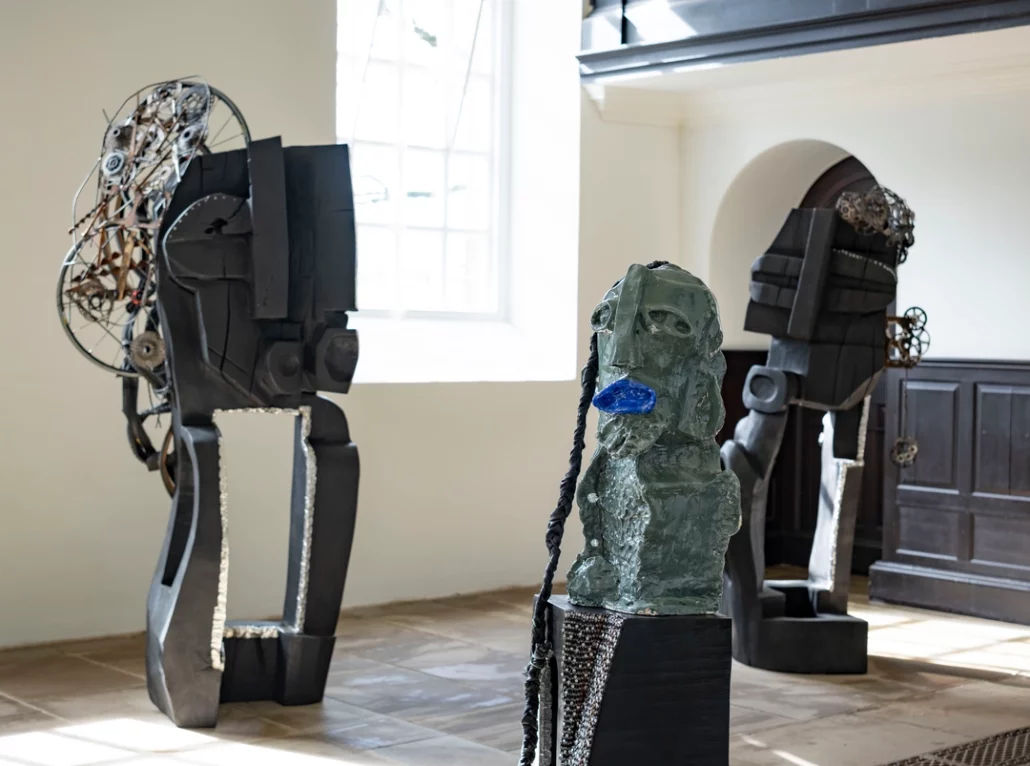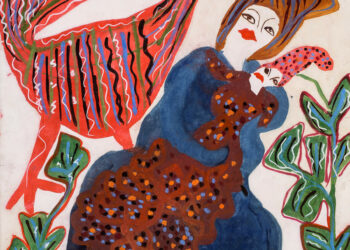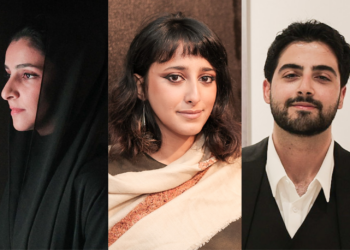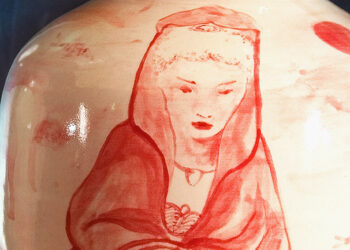On display in the Chapel, Leilah Babirye’s exhibition ‘Obumu (Unity)’ features new sculptures made at YSP specifically for this exhibition, largely from materials found onsite.

Photographer: Jonty Wilde
Babirye spent the summer of 2023 at YSP making a clan of seven larger-than-life-size figures in wood and five coloured ceramics. Supported by YSP’s technical team, the seven sculptures were carved using a chainsaw and chisels from trees that had reached the end of their life on site.
The artist describes being guided by the wood itself, sketching the initial forms directly onto the sectioned tree for carving. Once carved, the figures are refined and their surfaces sanded to highlight the grains of the tree. The sculptures are then burned a deep black, the charring once used to make the works ‘disappear’ but which is now a gesture of celebrating their beauty. Details of the sculptures are treated with a blowtorch before the surfaces are carefully waxed to acknowledge the skin of the piece and the tree from which it came.
The final stage is one Babirye calls ‘taking the girls to the salon’, in which found elements complete the sculptures, including bicycle chains, nails and copper from a dismantled boiler, as well as redundant stainless steel teapots.
At YSP Babirye also made five large ceramic portrait-sculptures, each with its own personality. They are created from coiled clay and boldly shaped into fundamental forms in which traces of the artist’s strong hands and fingers can be seen, before being fired and heavily coated with dense glazes that on firing contribute to the sculptures’ earthy, elemental power. Together the works will make a robust, rich statement in YSP’s Chapel, built in 1744, around the same time that the beech tree began to grow. Painterly glazes contrast with chiselled, roughly-textured woodwork and metal objects associated with the art of blacksmithing. The artworks become a congregation that celebrates community in all its forms in this beautiful and contemplative space, which has witnessed key moments in now-forgotten lives for centuries.
Babirye frequently uses traditional African masks to explore the diversity of LGBTQIA+ identities, assembling them from ceramics, metal and hand-carved wood; lustrous, painterly glazes are juxtaposed with chiselled, roughly-textured woodwork and metal objects associated with the art of blacksmithing. This will be her first solo museum show in the world. It is a highly appropriate setting, given that Babirye was inspired as a student by the work of Yorkshire-born Henry Moore, whose work is on continual display in the grounds of YSP.
Babirye’s practice originally began as activism, as a gay woman in her home country of Uganda, where being gay is illegal and risks the death penalty. Babirye’s use of discarded materials references the prejudiced slang for a gay person in the Luganda language – ‘abasiyazi’ – which is the part of the sugarcane husk that is rubbish, thrown out. Her practice integrates her own unique approach to making art with her culture and heritage and long-standing sculpture traditions such as mask making. Babirye acknowledged during her residence at YSP that she began to make art from real pain but now she feels blessed by the process and results of creativity.
Babirye was born in 1985 in Kampala, Uganda. She lives and works in Brooklyn, New York. She studied art at Makerere University in Kampala (2007–2010) and participated in the Fire Island Artist Residency (2015). In 2018, the artist was granted asylum in the US and presented her first solo show at Gordon Robichaux, New York. Her second opened in October 2020 and the gallery also hosted a pop-up exhibition of Babirye’s work in Los Angeles, California in February 2022. Stephen Friedman Gallery hosted her first solo show in the UK and Europe in June 2021.
Clare Lilley, YSP Director, says: “Leilah’s uncompromising sculpture always packs a punch. That these sculptures were created at YSP, with Leilah making the most of what this place has to offer, is very special. For almost 300 years, our Chapel has been a place for community and contemplation, and we’re privileged that Leilah has made it a home for her clan of compelling artworks.”
Supported by Stephen Friedman Gallery. The exhibition is on view from the 23rd of March until the 8th of September, 2024. For more information, please visit YSP.



